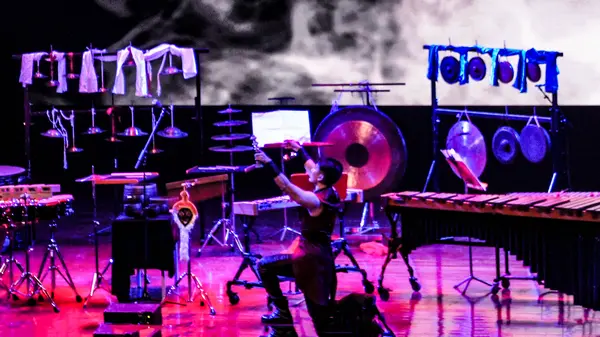In 1988, Zhang Xiaofu landed an opportunity to study music in Paris. After a month of learning French, the teacher from Beijing's Central Conservatory of Music embarked on his journey to France.
As he had planned, Zhang learned composition in Paris, continuing his classical music studies. But it was not until 1991 that Zhang began studying electronic music-a total foreign form of music to him.
The first time I listened to electronic music, I felt overwhelmed because it's a totally different form from classical music, Zhang says. For a composer, electronic music offers a broader vision for writing music, or let's say creating sounds.
He then began listening to the works of pioneering electronic music composers, and spent as much time as possible learning to use the equipment in the studio. Then, he started to think about creating music with sounds from his home country.
I've listened to a large number of works by French electronic music composers, which are full of abstract sounds with or without order. What about using sounds which are from China? he says.
Zhang had traveled to the Tibet autonomous region with his students in 1984 to collect music materials. He brought those materials and sound recordings of Tibet with him to Paris. Recordings included rotating prayer wheels in the hands of devout Buddhists, wind blowing the prayer flags, children singing and Buddhist chants.
Nuorilang marked the beginning of new work Zhang composed, and it premiered in Paris in 1996. The piece was inspired by Zhang's trip to Nuorilang Waterfalls in the Jiuzhaigou scenic area in Sichuan province, and there has since been more than 10 versions of it. The piece then evolved into a multimedia symphony in 2016, and was staged in Beijing.
As one of Zhang's most performed works, Nuorilang is a piece that he has never stopped revising and updating since 1996.
The 20-minute music piece will be staged again at the Tianqiao Performing Arts Center in Beijing on June 8, with a combination of three percussionists, visual images and sounds from both electronic music and classical music.
During the concert, Zhang will also stage another two music compositions inspired by Tibetan ethnic culture.
Drifting Dharani, which is 28 minutes long, will combine classical music with a soprano as well as visual images and electronic music sounds.
Yarlung Zangbo, a 40-minute-long music piece, will contain six chapters performed by a symphony orchestra and will feature electronic music arrangements.
The three music pieces were composed during the last three decades, which saw my aesthetic changes as a composer, Zhang says. I've traveled to Tibet many times to collect sound materials. It's a place full of inspiration. In the early years, I had to carry very heavy equipment with me, which were unforgettable experiences.
For the audience, Zhang adds that they will have a fresh experience of enjoying music. Amplifiers will be arranged onstage and among the audience. In one movement of Yarlung Zangbo, only one amplifier placed among the audience will be used. The sole amplifier will play recordings of an old Tibetan woman telling folk stories in local language.
I told the musicians that when they perform the three music pieces, they just have to imagine themselves being among snowy mountains, flowing rivers and lovely Tibetan people, Zhang adds.
The three music pieces were staged at one concert in Tianjin in November. This will be the first time the three music pieces will be performed as a trilogy in Beijing to portray Tibetan culture through multimedia, classical music, visual images and electronic music.
Though electronic music is often associated with words like abstract and obscure, I am glad that the audience enjoyed the concert because they shared familiar sounds with the music pieces, Zhang says.
As one of the first students to be admitted into the composition department of the Central Conservatory of Music in 1978 after the cultural revolution (1966-76), Zhang attended the well-known class of 1978 with classmates such as Tan Dun, Chen Qigang, Guo Wenjing and Liu Suola. Those musicians have become the first generation of Chinese composers to be recognized by the Western audience.
Before Zhang attended university, he spent eight years working with the singing and dancing troupe of Changchun city in Jilin province, where he composed music and played the erhu and bassoon.
Zhang was trained by composer Wu Zuqiang. After graduation in 1983, Zhang became a teacher at the university.
We focused on classical music studies then. It was hard to find materials about contemporary music in the library since the country was just opening-up, Zhang recalls.
After Zhang returned to China in 1994, he founded the Electro-Acoustic Music Center, which is part of the conservatory. It is the first professional institution researching modern electroacoustic music. He also founded the Beijing Electroacoustic Music Festival that same year, inviting international electronic musicians to perform in Beijing.
It's exciting to witness and be involved in the birth of a totally new academic major, Zhang says. From buying equipment to organizing teaching materials, we've trained students for bachelor's, master's and PhD degrees, who are now major sources of teachers of electronic music in the country.
(中国网英文)
 简体中文
简体中文



